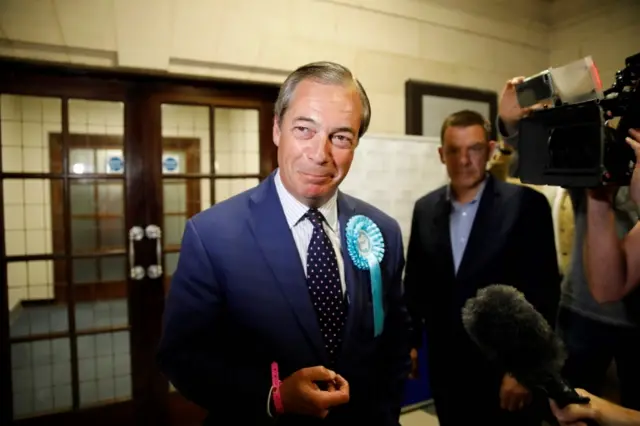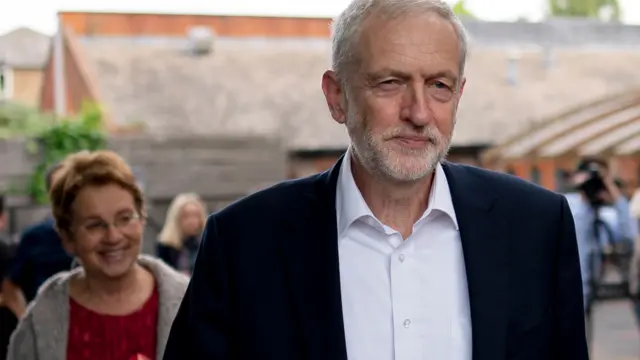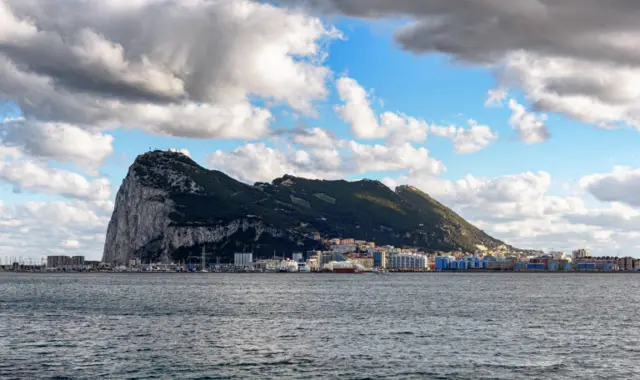Follow our separate Europe-wide results coveragepublished at 22:42 BST 26 May 2019
Over 400 million people across the EU's 28 member states were eligible to take part in the elections.
You can find a broader European view of tonight's results here.
The UK is electing 73 MEPs from across 12 regions - 11 have so far declared
The Brexit Party have 29 MEPs winning 32% of the vote and are largest party in nine regions
The Lib Dems have 16 MEPs, up 15, with a nationwide 20% share of the vote
Labour have 10 MEPs, down by 10, and their vote share has fallen to 14%
The Green Party have won seven MEPs, up four, with 12% vote share
The Conservatives have four MEPs, down 15, and are in fifth place on 9% of the vote
Change UK have not won any seats, nor have UKIP
In Scotland, the SNP have three MEPs, Brexit Party one, Lib Dems one and Conservatives one
The Brexit Party dominated in Wales, with Plaid Cymru second
Counting to determine the results in Northern Ireland began at 08:00
Overall turnout is 37%
Jo Couzens, Richard Morris, Rob Corp and Harriet Agerholm
Over 400 million people across the EU's 28 member states were eligible to take part in the elections.
You can find a broader European view of tonight's results here.
"It is going to be an absolutely great night for The Brexit Party," says anti-EU campaigner Suzanne Evans.
"Labour and the Conservatives have failed to deliver Brexit.
"The chickens are coming home to roost for them."
BBC political editor tweets...
Allow X content?
This article contains content provided by X. We ask for your permission before anything is loaded, as they may be using cookies and other technologies. You may want to read X’s cookie policy, external and privacy policy, external before accepting. To view this content choose ‘accept and continue’.
 Image source, AFP/ Getty Images
Image source, AFP/ Getty ImagesThe Brexit Party leader Nigel Farage arrives at the election count in the South East region
 Image source, EPA
Image source, EPALabour leader Jeremy Corbyn might not appreciate this result on his birthday.
His party has lost the borough of Islington to the Liberal Democrats.
Mr Corbyn lives in the borough, within which his Islington North constituency falls.
Allow X content?
This article contains content provided by X. We ask for your permission before anything is loaded, as they may be using cookies and other technologies. You may want to read X’s cookie policy, external and privacy policy, external before accepting. To view this content choose ‘accept and continue’.
"We are going to get a kicking," says Labour's Emily Thornberry.
"The point is we went into an election where the most important issue was our view on leaving the EU.
"And we were not clear on the one thing people wanted to hear.
"We should have said that any Brexit deal should be put to a confirmatory referendum.
"And that Labour would have campaigned to remain."
 BBC News Channel
BBC News Channel
"We knew these were going to be bad elections," says Conservative Helen Whately.
"We wanted to have left Europe by now. It is frustrating for us and for people who usually vote Conservative.
"It is going to be a bad night for us.
"The strong message is we have to get on and deliver Brexit."
The results coming in at the moment are local results at council level.
These will be totted up within local authority areas and then they will then be aggregated within the 12 larger regions.
And that's when we will know who the MEPs are.
BBC political correspondent Nick Eardley tweets...
Allow X content?
This article contains content provided by X. We ask for your permission before anything is loaded, as they may be using cookies and other technologies. You may want to read X’s cookie policy, external and privacy policy, external before accepting. To view this content choose ‘accept and continue’.
The first two results - in Leeds and Chelmsford, Essex - show increases in Green support of 2 and 7 points and so they may also be heading for better than the 8% that they won in 2014.
Change UK so far have registered 3%. It looks as though the forecast of the polls that they would perform poorly has been correct.
 Image source, Getty Images
Image source, Getty ImagesThe Liberal Democrats hold onto Gibraltar with a huge 77.4% of vote share.
The Brexit Party has also won Sunderland - previously held by Labour.
Nigel Farage's party won 39.8% of the vote.
Labour's vote share fell by 21.2% meaning they slipped to second place.
BBC Scotland correspondent James Shaw tweets...
Allow X content?
This article contains content provided by X. We ask for your permission before anything is loaded, as they may be using cookies and other technologies. You may want to read X’s cookie policy, external and privacy policy, external before accepting. To view this content choose ‘accept and continue’.
The Brexit Party has taken Leeds from Labour with 28.9%.
Labour gained 19.6% with the Lib Dems just behind on 18.4%.
The Conservatives are fifth, gaining 6.9% of the vote - behind the Greens who won 16%
BBC political editor Laura Kuenssberg tweets...
Allow X content?
This article contains content provided by X. We ask for your permission before anything is loaded, as they may be using cookies and other technologies. You may want to read X’s cookie policy, external and privacy policy, external before accepting. To view this content choose ‘accept and continue’.
 Laura Kuenssberg
Laura Kuenssberg
BBC political editor
Both of our big main parties expect to be punished very severely for the meltdown in Westminster over Brexit.
The flip-side for the smaller parties? The Lib Dems are feeling buoyant and of course, Nigel Farage is back with a vengeance.
It is possible if the Brexit Party are top that they will have a very profound impact on what comes next in the UK's attempts to leave the EU.
 Professor Sir John Curtice
Professor Sir John Curtice
Polling expert
It is not unlikely that the initial interest in tonight's results, apart from how well the Brexit Party does, is the status of the race for second place - some polling has suggested it is close between Labour and the Lib Dems.
As a guide, note that for the Lib Dems to overtake Labour they need just over a 9% swing across Britain as a whole. So whether or not they meet this target in the early results could well prove to be a crucial indicator to the overall picture tonight.
BBC political correspondent tweets...
Allow X content?
This article contains content provided by X. We ask for your permission before anything is loaded, as they may be using cookies and other technologies. You may want to read X’s cookie policy, external and privacy policy, external before accepting. To view this content choose ‘accept and continue’.
On the basis of the turnouts that have been collated from 150 councils, we estimate that the turnout in Great Britain will prove to be up by three points on 2014 and thus end up at some 37% or so.
This will make it the second highest turnout in an European Parliament election in Britain. It appears that the rise in turnout is somewhat greater in council areas that voted Remain in 2016 compared with those that backed Leave.